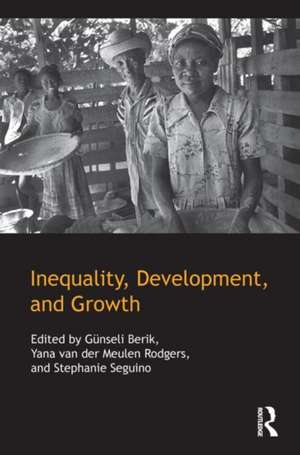Inequality, Development, and Growth
Editat de Günseli Berik, Yana van der Meulen Rodgers, Stephanie Seguinoen Limba Engleză Hardback – 14 dec 2010
The volume offers specific explanations for how the macroeconomy can hinder the achievement of gender equality and in turn how gender relations in areas like education and wage gaps can have macro-level impacts. Finally, the volume offers a rich array of policy options for promoting gender equality as both an intrinsic goal and a step toward improving well-being and broadly-shared development.
This book was published as a special issue of Feminist Economics.
| Toate formatele și edițiile | Preț | Express |
|---|---|---|
| Paperback (1) | 381.21 lei 6-8 săpt. | |
| Taylor & Francis – 13 dec 2010 | 381.21 lei 6-8 săpt. | |
| Hardback (1) | 1068.88 lei 6-8 săpt. | |
| Taylor & Francis – 14 dec 2010 | 1068.88 lei 6-8 săpt. |
Preț: 1068.88 lei
Preț vechi: 1303.51 lei
-18% Nou
Puncte Express: 1603
Preț estimativ în valută:
204.53€ • 211.01$ • 170.68£
204.53€ • 211.01$ • 170.68£
Carte tipărită la comandă
Livrare economică 27 martie-10 aprilie
Preluare comenzi: 021 569.72.76
Specificații
ISBN-13: 9780415599443
ISBN-10: 041559944X
Pagini: 376
Dimensiuni: 156 x 234 x 22 mm
Greutate: 0.86 kg
Ediția:1
Editura: Taylor & Francis
Colecția Routledge
Locul publicării:Oxford, United Kingdom
ISBN-10: 041559944X
Pagini: 376
Dimensiuni: 156 x 234 x 22 mm
Greutate: 0.86 kg
Ediția:1
Editura: Taylor & Francis
Colecția Routledge
Locul publicării:Oxford, United Kingdom
Public țintă
PostgraduateCuprins
1. Introduction: Feminist Economics of Inequality, Development, and Growth 2. Gender Equality and Economic Growth in the World Bank World Development Report 2006 3. Gender Disparity in Education and the International Competition for Foreign Direct Investment 4. The Impact of Gender Inequality in Education and Employment on Economic Growth: New Evidence for a Panel of Countries 5. Do Gender Disparities in Employment Increase Profitability? Evidence from the United States 6. Women’s Employment and Family Income Inequality during China’s Economic Transition 7. Do Economic Reforms Influence Home-Based Work? Evidence from India 8. Gender Disparities and Economic Growth in Kenya: A Social Accounting Matrix Approach 9. Globalization, Gender, and Poverty in the Senegal River Valley 10. Modeling Gender Effects of Pakistan’s Trade Liberalization 11. Gender, Monetary Policy, and Employment: The Case of Nine OECD Countries
Recenzii
"Drawing on feminist economics perspective, this book seeks to put the issue of inequality front and center in the analysis of economic growth and development. Adopting the capabilities approach of defining development as the advancement of human well being, the studies in this edited volume explore a wide range of ways to evaluate whether growth has enhanced shared human development or has merely enhanced pre-existing pockets of privilege. The book revisits the question of whether gender disparities impact growth with updated data. More importantly it also provides many fresh perspectives on the links between growth and inequality...Though in an environment where recognizing the problems withunrestricted faith on markets continues to be a hard sell despite the recent global recession, this book offers a very valuable and updated critique."–Ramya M. Vijaya
Descriere
This volume presents a comprehensive analysis of the linkages between inequality, development, and growth from a feminist economics perspective offering a rich array of policy options for promoting gender equality.
This book was published as a special issue of Feminist Economics.
This book was published as a special issue of Feminist Economics.























